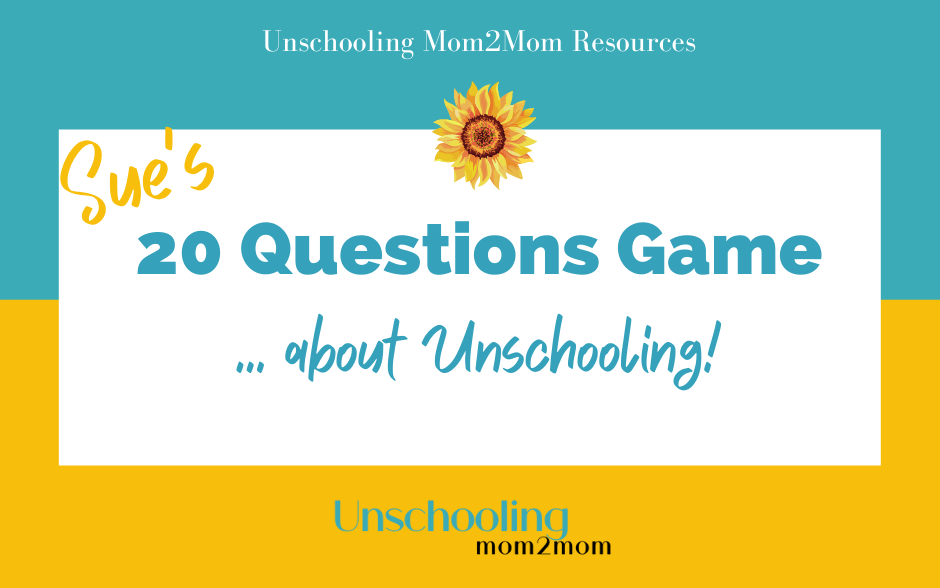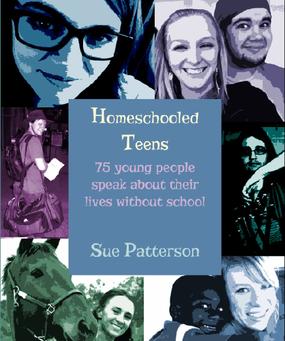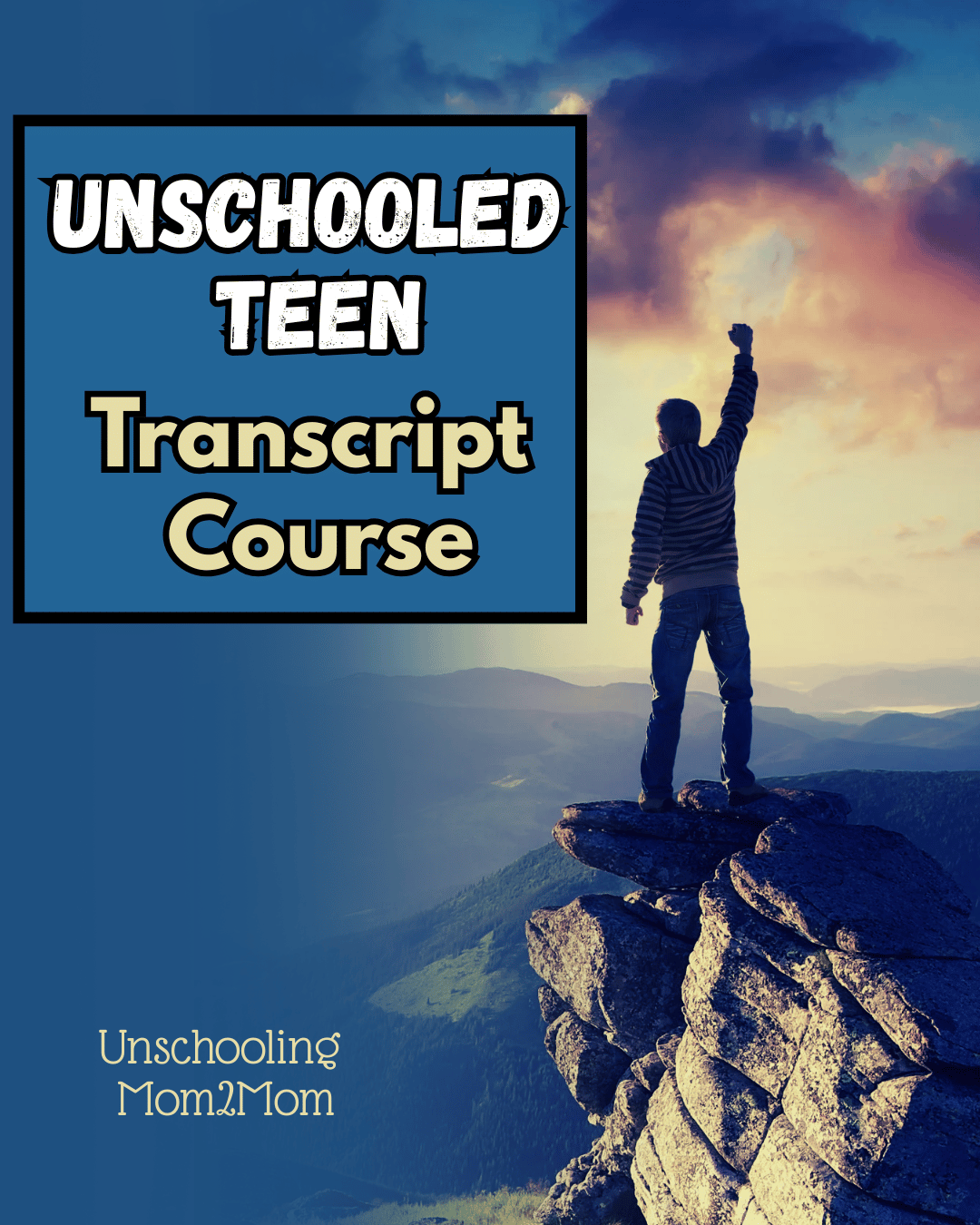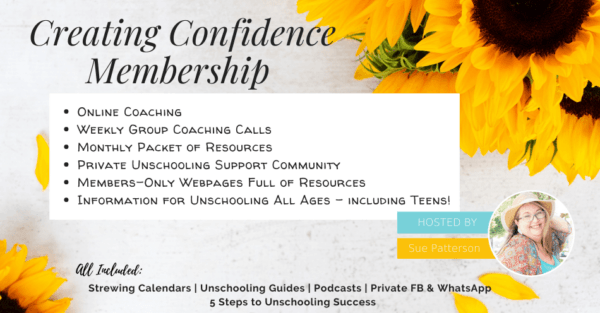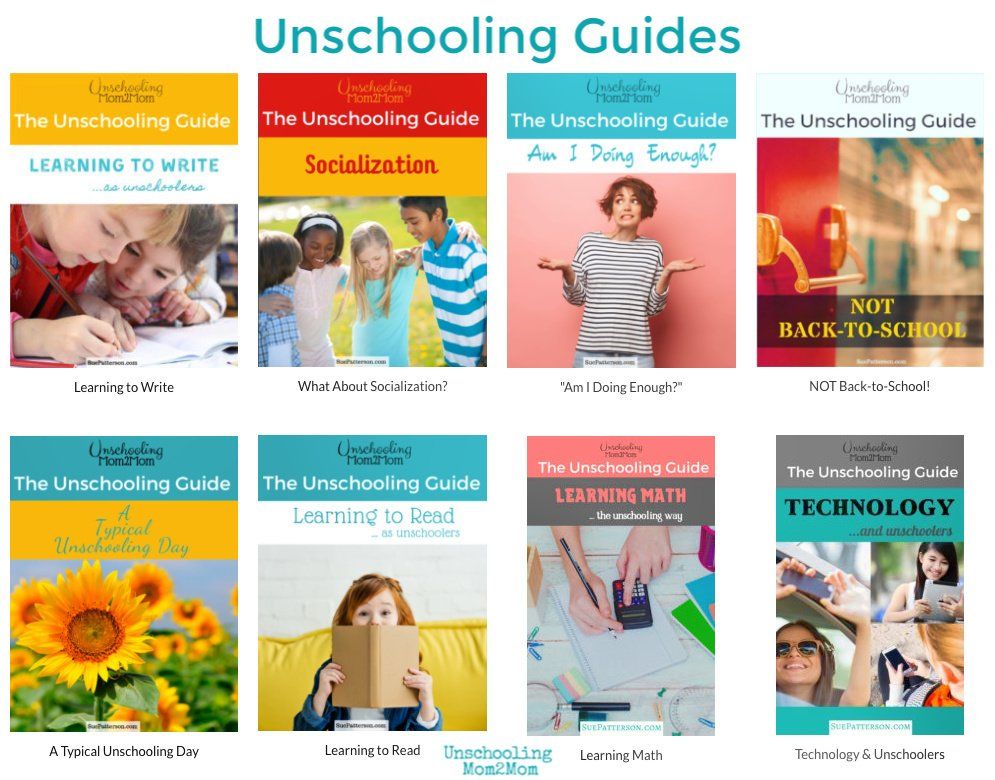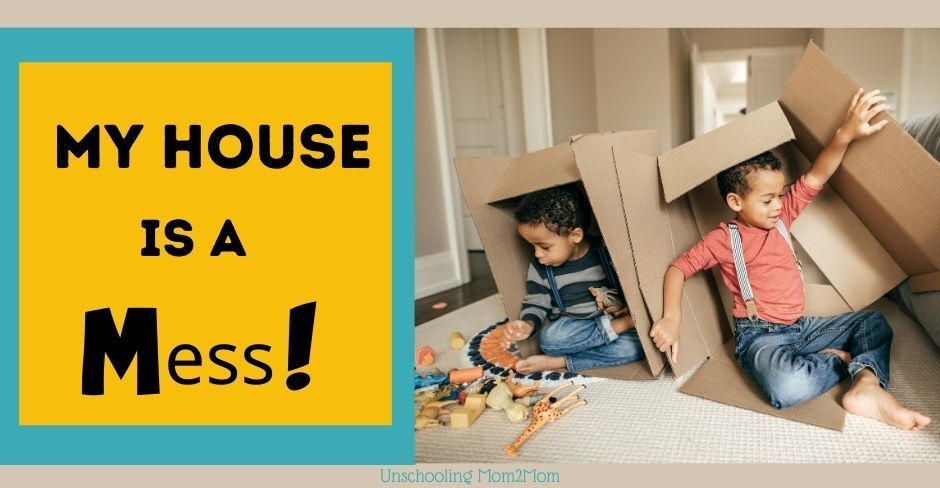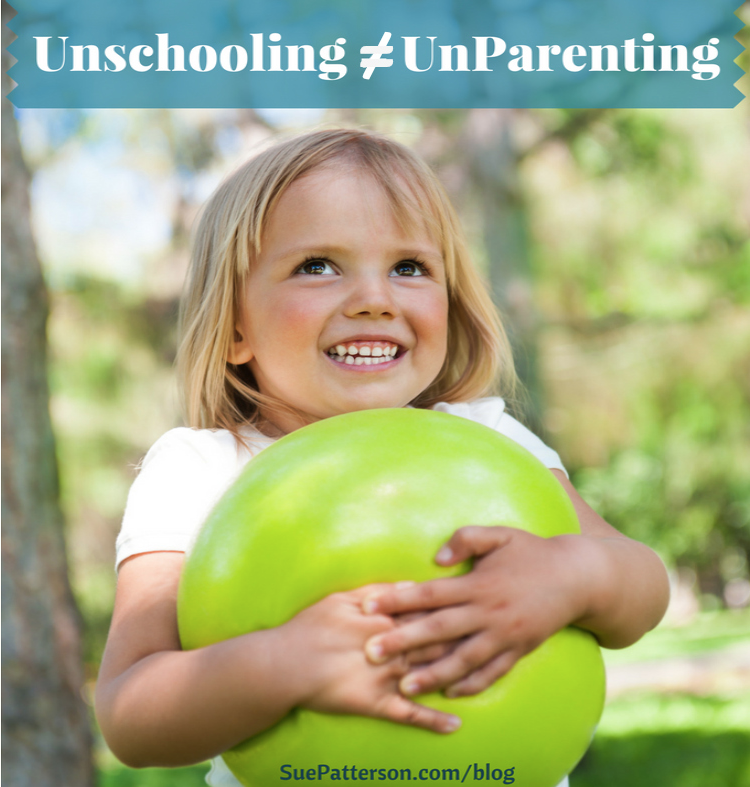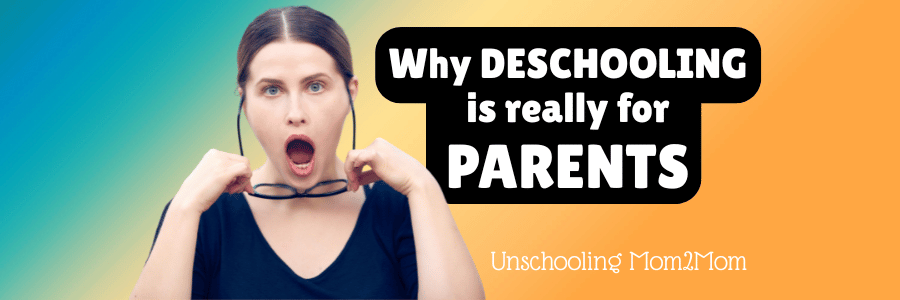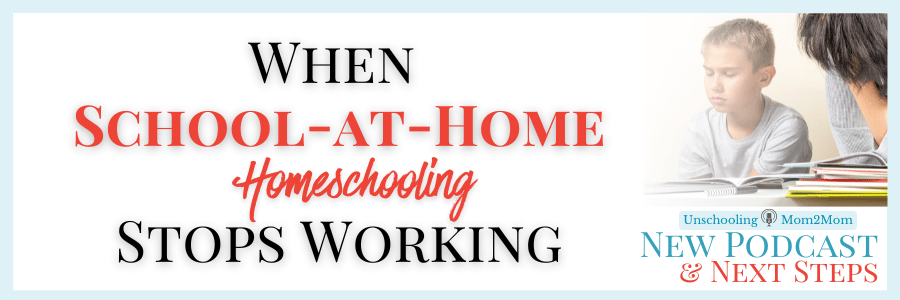20 Questions … About Unschooling
Let's Play!
Sue’s 20 Questions ... About Unschooling Game
1. What IS Unschooling anyway?
The short answer is that it’s creating an environment where natural learning can thrive. When we realize that everyone is hard-wired to learn, we stop seeing the need to orchestrate everything. It’s a Learner-focused instead of Teacher-focused approach.
- What is Unschooling here at the Unschooling Mom2Mom website.
- And also What is Unschooling
from the Unschooling Mom2Mom Podcast:
(available on all listening platforms!)
2. How do kids learn what they need if we don’t make them?
This question misses a really important part - that idea that we learn best when we are interested and engaged. Coercing learning - forcing anything really - creates resistance and undermines all the internal motivations to learn something. When we “make” the kids do a thing, we create even more obstacles.
But to the part of the question that's underneath... how will they know what they need to know? This is probably the crux of everyone's fears about unschooling, right?
"OK, so I don't *make* them - how will they be prepared?"
Here's the good news! It's in their hard-wiring. All humans are curious and want to learn. It's in our nature. What we, as parents who have spent a long time in school, keep forgetting, is that Life is sprinkling interesting opportunities in our paths all the time. But we get so focused on what schools and curriculum companies say about the content and more importantly WHEN kids need to learn certain things, we feel pressure and stop noticing the learning that weaves throughout our day. I could go on and on about this!
But this podcast and the ebook I've created may help you dive in deeper: Everyting Really DOES Count
3. Do unschoolers really have NO structure?
This is a misconception. Everyday life has a structure to it.
Waking up, eating meals, rhythms that emerge in a day… this is the start of a natural structure - not artificial like Math at 10 and Reading at 11. What if we want to do more than that?
Or it’s a day that some awesome exhibit is coming through town at the local museum.
Or it’s raining outside and our picnic plans aren’t going to happen.
Or it’s finally sunny after days of rain?
One of the benefits of stepping away from a school system (or a curriculum approach) is having the freedom to do what fits with the people in your family on that particular day.
“Having Structure” gives us some kind of false reassurance that all will be well - if we just stick with the structure! That’s from years of being conditioned not to trust ourselves and to believe that the structure of the system is more important than the needs of the individual.
Unschooling uses a loose structure that is flexible enough to accommodate all the variables that show up.
4. What’s a typical unschooling day like?
Everyone really wants a formula. Something they can duplicate. But it doesn’t work like that. My family’s typical day wouldn’t look anything like yours. It’s part of truly individualizing everything. Because, when you do that, one day may not look like the next even within your own family. You want to take advantage of whatever pops up. It’s part of the adventure!
Also, remember that we have had a lot of years being convinced that there’s one right answer - or one way to get to that right answer. So the idea of actually LOOKING for a creative approach to the day can be really foreign to us! It takes a while to build your confidence.
5. Don't kids have to learn "grit" and do things they don't want to do?
Probably the answer is “yes.” And they do that whenever they’re allowed to pursue their interests. Inevitably, they will want to do something they don’t yet have the knowledge or skill to do. But because they want that end goal , they will work hard to gain what the need to get it. They’ll be developing “grit.”
But kids who are told “no” often by their parents, in the interest of developing grit and character, really are learning other things like:
- How they cannot rely on the adults in their lives
- How they will have to work around these adults to get what they want
- Maybe they will simply be told no, and shut down…. Telling themselves they have right to ask for something or that their preferences are not as valuable as the preferences of those in charge. They become conformers and People Pleasers.
Which takes me to the next question…
6. Do unschooled kids ever hear the word “No!” ?
Of course they do!
They just hear “yes” more often. “Yes” becomes the knee jerk response from the parents. Kind of like doing Improv! “Yes... and what part of this can we make happen?”
What piece of the request CAN get a “yes?”
Do they need help with a strategy to get to the end result they want?
So many of grew up with “No,” as the answer given by our own parents. And it’s understandable! We see that now. “No,” is easier. “No,” requires no thought on our part. And we’re exhausted for a million reasons. But “No,” is dismissive and demoralizing.
As Unschoolers, we want to go another direction.
7. How do they have any friends?
They meet people who share their interests by engaging in activities they enjoy. They meet people in the world and become friends. No, it’s not the friendships that come from desk proximity or whose last name shares the same first letter. But centering around shared interests gives a much better chance for a deeper friendship to be formed - more like how adults make friends in the real world.
Unschooled kids make friends more like this - because they’re living life in the Real World.
The Teens will Tell You!
I wrote a book interviewing 75 young people (from age 15-39) about what their lives were like as teens who didn't go to school. And this topic about making friends certainly came up! And they explained in great detail how they DID and DO make friends.
They answer this and 25 more questions that parents (and other teens!) worry about if they choose this unconventional option.
Grab this book - in hard copy or digital formats
- and get the reassurance you need!
8. Will Unschooling work for teens?
Absolutely! At any age, kids can switch from the school approach to unschooling. They can dive into Life - creating days that can make them happy! For so many families, this is such a relief!
Read more about Unschooling Teens...
9. How do they get a diploma or transcript?
As the Principal and Administrator of your Home School, the parents create the transcript and diploma. You’ll sign it, date it… and they’re good to go. Subjects weave through every day activities. Unschooling parents become more adept at SEEING these things - then it becomes easier to record.
Unschooling & Transcripts Mini-Course
Sometimes you need a little help translating their unschooled life into a transcript. Sue has helped lots families do this in workshops - and now it's available for anyone who needs it.
Included:
- Workshop Recording
- Workbook
- Everything Counts Ebook
10. How do they get into college?
The same way everyone else does. Usually there’s an assessment test for a community college or TAFE… and they get put into the classes that fit with their scores. They can transfer their classes to a university, and then they’re in.
Some kids choose to get an SAT or ACT book, study for the exam, and then get into a university based on the score. You can take those tests multiple times.
There’s really something to say for maturity. A kid that wants to go this route, will study and learn what they need. Sometimes it’s hard to believe that when we are looking at a younger teen… but maturity is real. They’ll get there.
Read more about how this works for unschooled teens...
11. How long should a person DESCHOOL?
It’s going to vary. There’s a formula about 1 month for every year the person was in school. So if you went for 12 or 13 years, you (the parent) will be working on Deschooling for over a year. The child less so… because they’ve gone less. But Deschooling can pop up all throughout parenting. Something that didn’t matter to you when they were 7or 8 may be a big deal to you (or lots for you to unpack) when they hit 13.
It’s always good to read and listen to a lot about Deschooling.
That way you can recognize what’s happening when certain thoughts pop into your head.

Need More on Deschooling?
I created an Unschooling Guide that can walk you through all the important information about unschooling.
12. Is unschooling just for rich people?
No. I knew someone who said,
"All anyone needs is a bus pass and a library card!"
Lots of ways exist to help a family explore the world in a more frugal way.
We have information to help you find ways to have unschooling adventures - and save money! Here:
Unschooling Mom2Mom Resources: Unschoolers and Limited Budgets
13. Can single parents unschool?
Yes. It takes some juggling, for sure. And it depends on the age and maturity of the child. It's much easier with a good support system - you may have to create one.
A lot will also depend on the communication and trust between the parents and the kids - but single moms unschool all the time.
We have collected information for single parents here:
14. How do we have balance?
I think you have to get a more big picture look at it all. It may not look very balanced over a day or two, but when you look at it over a longer span of time, a bigger arc, you can somehow see some balance.
Still, balance is overrated, I think. Some people are dabblers while others a natural deep divers. An artist maybe not need to have equal exposure to other subjects - except in how they relate to their art. The same with kids who like to build or enjoy science. You may not SEE the balance that is actually there - especially if you haven’t deschooled.
15. How do regular homeschoolers switch to unschooling?
I think when the homeschooling approach stops working, the power struggles get too intense, the gap widens between the parent and the kid… this is when parents start to think,
"Ok, tell me about this unschooling thing.”
- Start by shelving the curricula and leaning toward what the child enjoys.
- Brainstorm with them about fun things to do. Keep subjects per se, off the table… just think in terms of topics.
- Play more together.
Think of your favorite Saturdays. Live like that.
Odds are that you’ll need some support - fear makes us second-guess everything. I have options for that… the membership, a course, unschooling guides. Resources are available to help.
16. Is your house always a mess?
Yeah. The Lived in Look. We have lots of stories in our heads about OUR worth being associated with the cleanliness of our house… we have to unpack that. Lots of people live there. Lots of projects are emerging. Living a Life with Creativity and CURIOSITY is messy!
17. Do you ever get any time OFF?
This worries a lot of people. Partly, it’s a society thing we’ve had pushed pushed onto us… separating us from our kids and making mothering and parenting feel like a burden instead of a choice - that WE made.
But there are ways to get your batteries recharged. Lots of ways, really. And they don’t always require a weekend away from your life. And… if you’re having trouble connecting with your kids - which is often the case when they’re going to school or you’re pushing a curriculum - from an unschooling standpoint, that will be something to resolve.
Here's a quick overview about Unschooling and "Me Time."
18. Is Unschooling Unparenting?
No. Not at all. It’s probably the farthest from that. It’s a more engaged and more connected style of parenting. I have an article you can read that might help clarify this some more.
19. What does RADICAL Unschooling mean?
This isn’t as scary as it may sound. It’s simply incorporating unschooling principles in all aspects of your family life.
Instead of only thinking of unschooling as a method for homeschooling, radical unschoolers see how effective it is for all kinds of learning and apply it to the parenting issues as well. The word, “Radical” in this case, is defined more mathematically. It has to do with getting to the root and permeating into all aspects.
Read more about Radical Unschooling here
20. Why choose something like unschooling?
For me, it was because you only get one childhood. You have no idea how long you’re going to have on this earth… and God Forbid, they have a short life. I don’t want them to have wasted it sitting in a school room waiting for life to start!
And of course, other ideas factored in as we moved away from the schoolish way of thinking and into unschooling.
Everyone’s list is going to be different.
But we initially made the choice because unschooling...
- allowed them more time to explore their curiosities and preferences
- provided more adventures with the family and out in the world,
- gave us more flexibility to enjoy life together.
How about THAT for my 20 Questions Game with you?
Probably each topic could be a podcast in and of itself!
Some of them already are!
Past Podcasts associate with these 20 questions:
(Remember, these are only 5-10 minute audios - you have time for that!)
- What is Unschooling?
- How will they learn what they need to know?
- Structure, Schedules... and Unschooling?
- "Am I Doing Enough?"
- What About Socialization?
- Let's Talk about Unschooling Teens
- Can Unschooled Teens Get Into College?
- Deschooling... for HOW long?
- What REALLY Matters...
- Your Unschooling Nest

